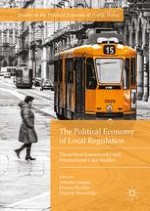This book offers theoretical and methodological guidelines for researching the complex regulation of local infrastructure, utilities and public services in the context of rapid urbanisation, technological change, and climate change. It examines the interactions between regulators, public officers, infrastructure and utilities firms, public service providers, citizens, and civil society organisations. It contains contributions from academics and practitioners from various disciplinary perspectives and from many regions of the world, illustrated with case studies from several sectors including water, natural gas and electricity distribution, local public transport, district heating, urban waste, and environmental services.
